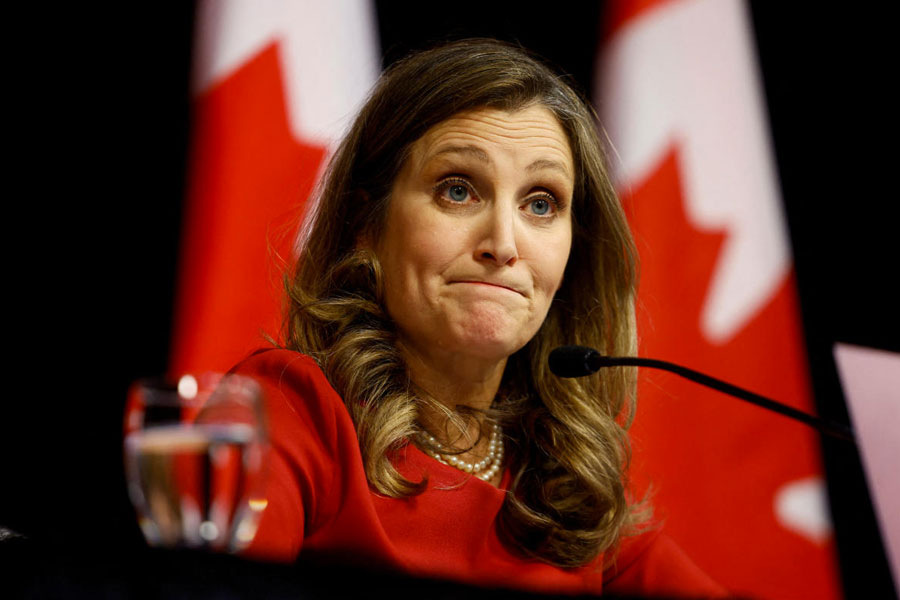Canadian Finance Minister Chrystia Freeland quit on Monday after clashing with Prime Minister Justin Trudeau on issues including how to handle possible U.S. tariffs, dealing an unexpected blow to an already unpopular government.
Freeland said she was quitting in the wake of a meeting last Friday with Trudeau, who asked her to take on a lesser post after the two had been arguing for weeks over spending.
Public Safety Minister Dominic LeBlanc - a member of Trudeau's inner circle - was quickly named finance minister of the minority Liberal government.
The resignation of Freeland, 56, who also served as deputy prime minister, is one of the biggest crises Trudeau has faced since taking power in November 2015. It also leaves him without a key ally when he is on track to lose the next election to the official opposition Conservatives.
A Liberal source said Trudeau wanted Freeland to serve as minister without portfolio dealing with Canada-U.S. relations in name only - in effect a major demotion.
Trudeau met the national Liberal caucus later on Monday - including Freeland - but legislators declined to say afterwards what had happened.
Labour Minister Steven MacKinnon said there had been a good and frank conversation but gave no details.
The potential threat was underlined when a top member of the opposition New Democrats, who have been helping keep the Liberals in power, said the party would vote to bring down Trudeau next year unless he quit.
"If we're coming up to a straight up non-confidence motion at the end of February, early March, that's one of the tools that we have," House of Commons leader for the NDP Peter Julian told the Canadian Broadcasting Corp.
"We simply cannot continue like this," he said, adding he expected Trudeau to have resigned by then.
Party leader Jagmeet Singh had earlier been less equivocal when asked about bringing down Trudeau, whom he insisted should resign.
Freeland quit just hours before she was due to present a fall economic update to parliament. The document showed the minority Liberal government had run up a 2023/24 budget deficit of C$61.9 billion, much higher than predicted.
Trudeau can be toppled if the opposition parties unite against him on a vote of no confidence, though that cannot happen until next year.
"Will the Prime Minister stay on? I think he will, but he's certainly been seriously threatened ... it could be that this is the event that will push him over the edge," said Jonathan Malloy, a political science professor at Carleton University in Ottawa.
Parliament is due to break for Christmas on Tuesday and not return until Jan. 27.
Domestic media reports said Freeland and Trudeau had clashed over a government proposal for temporary tax breaks and other spending measures.
"For the last number of weeks, you and I have found ourselves at odds over the best path forward for Canada," Freeland said in a letter to Trudeau posted on X.
Freeland said the threat of new U.S. tariffs represented a grave threat.
"That means keeping our fiscal powder dry today, so we have the reserves we may need for a tariff war. That means eschewing costly political gimmicks, which we can ill afford," she wrote.
Conservative leader Pierre Poilievre said the government was spiraling out of control.
"We cannot accept this kind of chaos, division, weakness, while we're staring down the barrel of a 25% tariff from our biggest trading partner," he told reporters.
'Leadership crisis'
"This will likely trigger a leadership crisis within the Liberal caucus ... (it) is politically and personally devastating for Trudeau," said Nik Nanos, founder of the Nanos Research polling firm.
Polls show the Liberals are set to be crushed in an election that must be held by late October 2025.
Freeland, a former journalist, served as trade minister and then foreign minister before taking over the finance portfolio in August 2020. As minister, she oversaw the massive government spending campaign to deal with the damage done by COVID.
Trudeau has been under pressure for months from Liberal legislators alarmed by the party's poor polling numbers, in part due to unhappiness over high prices, and the loss of two safe parliamentary seats in special elections.
The party is due to contest another special election in the province of British Columbia later on Monday.
'Bombshell' decision
"This is quite a bombshell," said Nelson Wiseman, political science professor at University of Toronto. "I think the problem the Liberals have is that they have no mechanism to remove Trudeau. Only a full blown caucus revolt could do that."
Canada's 10-year note yields climbed to their highest level since Nov. 28. They were last up 4.2 basis points at 3.2%. The Canadian dollar weakened to a four and a half year low at 1.4268 per U.S. dollar before reversing course.
When Trump came to power in 2017 he vowed to tear up the trilateral free trade treaty with Canada and Mexico. Freeland played a large role in helping renegotiate the pact and saving Canada's economy, which is heavily reliant on the United States.
Although tensions between prime ministers and finance ministers are not unusual - Trudeau's first finance minister quit in 2020 in a clash over spending - the level of invective in Freeland's letter was remarkable by Canadian standards.
Freeland left the same day as Housing Minister Sean Fraser announced he was resigning for family reasons. Another six ministers have either already quit or announced they will not be running again in the next election.
Before entering politics in 2013, Freeland worked as a journalist and in senior editorial roles with several media companies, including the Financial Times, the Globe and Mail, and Reuters where she worked from 2010 to 2013.











